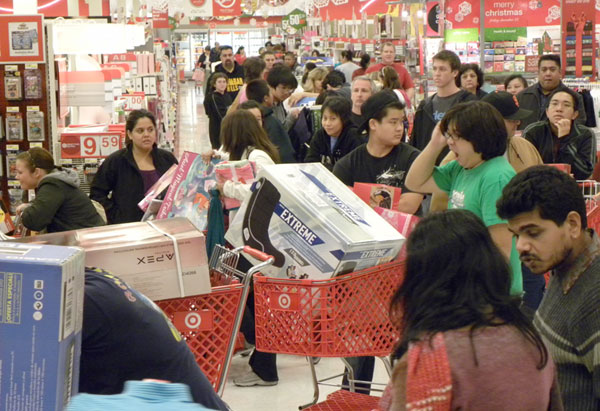As the tryptophan streams through Americans’ veins Thursday, the
lackadaisical feeling will only last so long. Black Friday will
start before Friday even begins for some dedicated shoppers in
South County.
As the tryptophan streams through Americans’ veins Thursday, the lackadaisical feeling will only last so long. Black Friday will start before Friday even begins for some dedicated shoppers in South County.
“We probably won’t go to sleep that night,” Susie Hawkins said about Thanksgiving evening. She was out shopping at Target with her mother Patricia Possley Monday morning.
The late-night – or early morning – hunt isn’t new to Hawkins. A few years ago she kept her hand on a computer at the 24-hour Wal-Mart on Cochrane Road for hours until the store opened it’s sale about 3 a.m., Hawkins recalled.
“That one was mine, my hand was on it,” Hawkins said. She lives in Hollister but is staying in Morgan Hill for the week to enjoy Thanksgiving and pounce on the sales around town; digital cameras for her daughters top the shopping list this year.
Consumers can linger all night inside Wal-Mart until its Black Friday sale kicks off at 5 a.m. Last year, the big-ticket sale items – mostly electronics – were wrapped in plastic with a first-come, first-served rule.
At Target in Cochrane Plaza the doors open at 4 a.m. and a long line outside the store is likely to start overnight.
“We expect big crowds; the normal busy, Black Friday crowds. We’ll be well-staffed. Our new produce section has brought a lot of excitement to the store,” said store manager Olivia, who declined to give her last name.
According to investopedia.com, “black” is used because it’s an accounting term that “alludes to the practice of recording losses in red and profits in black.” Thus the term Black Friday.
Consumers are expected to help businesses creep into the black by spending more online than they did last year; $318 million was spent on Cyber Monday in 2009. “Cyber Monday” was coined by Shop.org in 2005 when retailers noticed a trend of people shopping online the Monday after Thanksgiving.
As many as 138 million people say they plan to shop in person this Black Friday weekend, up 4 million people from last year, according to a National Retail Federation survey.
At the Gilroy Premium Outlets, the doors will open at midnight for eager buyers.
“In order to accommodate the large amounts of shoppers, we plan months in advance for our holiday season. Merchants increase staff to better serve shoppers and we at the center implement a very detailed holiday security plan. We also work with the local municipality and the police to take pro active measures on traffic control,” said Jeannie Omel, general manager of Gilroy Premium Outlets.
Morgan Hill resident Linda Salazar waited in the Target line last year that she said stretched the length of the building. Her eye was on a Garmin GPS.
“I’m waiting to see if iPads go on sale. I will shop online too, it just depends on what’s on sale,” Salazar said.
Every Christmas Salazar saves the same amount of money for gifts, “so I’m not paying for things all year long.”
Seven in 10 shoppers plan to use cash or their debit cards to pay for holiday purchases and not credit cards, according to a survey by the National Foundation for Credit Counseling. Of course, what consumers say they will do and what they actually do could be quite different.
“My question is, where are the folks getting the money?” said Gail Cunningham, spokeswoman for the National Foundation for Credit Counseling, who questioned results of her own organization’s survey. “I’m cynical about that. I doubt that they have (saved). I hope I’m wrong. I hope they follow through with their good intentions.”
The trend away from credit cards began a few years ago. Credit card use for holiday gift-buying peaked in 2007, at more than 32 percent, and has trended lower since, according to the National Retail Federation. This year, use of credit cards is expected to be the lowest since 2002, the organization said.
For consumers who end up paying for holiday purchases with plastic, the question is: Will they pay the balance in full when the bill arrives?
“If the credit card gives points or incentives for using it, I just use my set-aside Christmas money to pay it off,” Salazar said.
At the polar opposite are consumers who avoid Black Friday shopping altogether, like Lauraine Nordby.
“It’s too crowded. You have to wait too long. It’s not worth it,” she said Monday morning.
Nordby’s shopping philosophy is straight-forward: “I know what I want to buy and (Black Friday) is for people who want to spend a whole lot of money, searching for things to buy.”
Eighty percent of people claim to have at least a general plan for income and expenses, up from 47 percent in 2006, according to a survey by Synovate commissioned by personal finance author Matt Bell.
Since consumer debt peaked in 2008, Americans have chopped $922 million from their debt, or 7.4 percent, according to the Federal Reserve. Americans are reducing debt at a pace unseen in at least a decade, according to a recent Fed report, “Have Consumers Become More Frugal?” Unclear, say researchers, is whether that new frugality stems from borrowers being forced to pay down debt as credit standards tighten, or whether it’s a voluntary – and permanent – shift in behavior.








